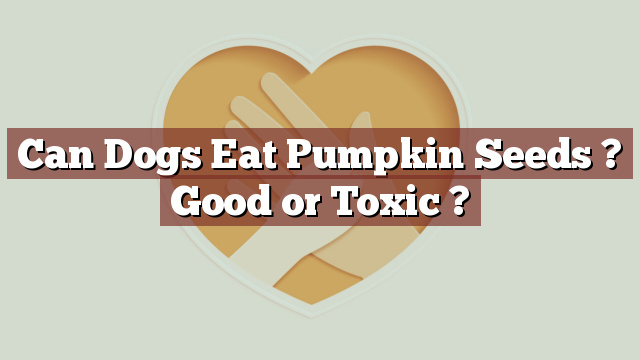Can Dogs Eat Pumpkin Seeds? Good or Toxic?
Knowing what foods are safe for our pets is crucial for their overall health and wellbeing. As responsible pet owners, we must be aware of what our furry friends can and cannot consume. One popular food that often raises questions is pumpkin seeds. In this article, we will explore whether dogs can safely eat pumpkin seeds and the potential risks or benefits associated with their consumption.
Nutritional Value of Pumpkin Seeds: What Do They Contain?
Pumpkin seeds are known for their rich nutritional profile. They are packed with essential nutrients such as protein, fiber, magnesium, iron, zinc, and vitamins A, C, and E. Additionally, pumpkin seeds are a good source of antioxidants, which can help support a dog’s immune system. These seeds also contain healthy fats, which promote a shiny coat and healthy skin.
Are Pumpkin Seeds Safe or Toxic for Dogs?
Yes, dogs can safely eat pumpkin seeds! Pumpkin seeds are generally considered safe for canine consumption. However, there are a few important considerations to keep in mind. It is essential to feed your dog plain, unsalted pumpkin seeds. Salted or flavored pumpkin seeds can be harmful due to the high sodium content or potential added ingredients that could be toxic to dogs. Additionally, it is crucial to remove the outer shell of the seed before offering them to your furry companion. The shell can be difficult to digest and may cause gastrointestinal issues.
Potential Risks or Benefits of Dogs Consuming Pumpkin Seeds
When fed in moderation, pumpkin seeds can offer several benefits to your dog’s health. The high fiber content in these seeds can aid in digestion and promote regular bowel movements. Their nutrient-rich composition can also support a healthy immune system, promote cardiovascular health, and contribute to overall skin and coat health. However, it’s important to note that excessive consumption of pumpkin seeds may lead to an upset stomach or diarrhea. Therefore, it is crucial to feed them in moderation as part of a balanced diet.
What to Do if Your Dog Eats Pumpkin Seeds: Precautions and Recommendations
If your dog accidentally consumes pumpkin seeds, there is usually no cause for immediate concern. However, keep an eye out for any unusual symptoms such as vomiting, diarrhea, or abdominal discomfort. If any of these symptoms persist or worsen, it is advisable to consult your veterinarian for further guidance. Additionally, always remember to introduce new foods gradually and in small amounts to minimize the risk of digestive upset.
Conclusion: Can Dogs Eat Pumpkin Seeds? Considerations and Final Thoughts
In conclusion, dogs can safely consume pumpkin seeds as long as they are plain, unsalted, and the outer shell is removed. These seeds offer various nutritional benefits and can be a healthy addition to your dog’s diet. However, it is important to feed them in moderation to avoid any potential digestive issues. As with any dietary changes or concerns, it is always best to consult with your veterinarian for personalized advice based on your dog’s specific needs and health condition. By being mindful of what we feed our beloved pets, we can ensure their well-being and provide them with a healthy and balanced diet.
Thank you for investing your time in exploring [page_title] on Can-Eat.org. Our goal is to provide readers like you with thorough and reliable information about various dietary topics. Each article, including [page_title], stems from diligent research and a passion for understanding the nuances of our food choices. We believe that knowledge is a vital step towards making informed and healthy decisions. However, while "[page_title]" sheds light on its specific topic, it's crucial to remember that everyone's body reacts differently to foods and dietary changes. What might be beneficial for one person could have different effects on another. Before you consider integrating suggestions or insights from "[page_title]" into your diet, it's always wise to consult with a nutritionist or healthcare professional. Their specialized knowledge ensures that you're making choices best suited to your individual health needs. As you navigate [page_title], be mindful of potential allergies, intolerances, or unique dietary requirements you may have. No singular article can capture the vast diversity of human health, and individualized guidance is invaluable. The content provided in [page_title] serves as a general guide. It is not, by any means, a substitute for personalized medical or nutritional advice. Your health should always be the top priority, and professional guidance is the best path forward. In your journey towards a balanced and nutritious lifestyle, we hope that [page_title] serves as a helpful stepping stone. Remember, informed decisions lead to healthier outcomes. Thank you for trusting Can-Eat.org. Continue exploring, learning, and prioritizing your health. Cheers to a well-informed and healthier future!

